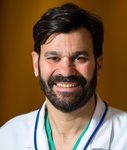

Bariatric surgery offers an effective, safe solution for weight loss for adults and adolescents diagnosed with clinically severe obesity that also reduces risks for developing diabetes and other illnesses.
Years of research have shown obesity is a complex disease and bariatric surgery, while highly effective, is just one component of a successful treatment plan. The Cayuga Center for Metabolic and Bariatric Surgery at Cayuga Wellness Center has developed a program that links patients to specialists who manage health issues related to obesity as well as diet, nutrition, exercise and lifestyle modification for effective, long-term weight loss. Obesity treatment is undergoing a shift on when surgery is recommended. Earlier surgical care, when combined with other treatments, prevents many patients from developing other obesity-related illnesses.
Who should consider bariatric surgery?
Bariatric surgery is considered for people with a body mass index (BMI) of greater than 35. For example, a 5-foot, 10-inch-tall person weighing 250 pounds has a BWI of just over 35. Patients with weight-related illnesses such as heart disease or Type 2 diabetes may be bariatric surgery candidates at lower BMIs.
Why is weight-loss surgery, rather than dieting, recommended for people with clinically severe obesity?
Many studies show patients with extreme obesity are more successful in weight reduction with surgical treatment than with dieting or exercise alone. Numerous medical groups from the American Diabetes Association and the American Heart Association to federal health agencies, including the National Institutes of Health and the Centers for Medicare & Medicaid Services, recommend bariatric surgery for effective weight loss in cases of severe obesity.
What types of bariatric surgery are available at Cayuga Medical Center?
Minimally invasive robotic-assisted surgery has become the most frequent type of bariatric surgery used at Cayuga Medical Center, and conventional laparoscopic bariatric surgery is also available.
Board certified general surgeons Brian Bollo, MD, and John Mecenas, MD, with the Cayuga Center for Metabolic and Bariatric Surgery have completed over 500 robotic surgeries in a variety of minimally invasive procedures since 2019 when the hospital acquired the advanced da Vinci Si robotic surgery system. They also provide minimally invasive laparoscopic bariatric surgery.
How long do the surgeries take, how many days would I be hospitalized and is the surgery covered by insurance?
Depending on the type of surgery, the procedure takes one to two hours, and the hospital stay may be one to two nights, but sometimes not require an over-night stay. The bariatric surgeries offered are covered by Medicare and most private insurance plans.
How does a patient prepare for bariatric surgery?
Discussing your concerns with your primary care provider is always a good first step. Your primary physician can help by referring you to a surgeon. The surgeon will advise you on tests needed prior to surgery and precautions to make in the days preceding the operation. In addition, starting and following a weight loss and exercise program for several months prior to surgery may increase weight loss and improve patient outcomes.
What should a patient look for in a bariatric surgery program?
First, find an experienced, board-certified surgeon who has specialized training in robotic and laparoscopic bariatric surgery. Patients should look for a program that links various aspects of their care. A team approach is the best way to treat obesity because the causes and consequences of the disease are so varied. Patients should look for a program that links various aspects of their care. The program at the Cayuga Center for Metabolic and Bariatric Surgery works to include a patient’s primary care physician, board-certified surgeons, and a medical doctor specializing in obesity treatment. The program also involves nurses, health educators, dieticians and exercise physiologists. Developing that continuum of care is the goal of the Cayuga Center for Metabolic and Bariatric Surgery and the Cayuga Center for Healthy Living.
Following surgery, many patients benefit from joining a weight-loss surgery support group. Regular meetings for bariatric surgery patients are held at Cayuga Medical Center.
___
Dr. Mecenas and Dr. Bollo are board-certified general surgeons with advanced training in bariatric surgery and minimally invasive surgery using laparoscopic and robotic surgical technology. For additional information on bariatric surgery, go to cayugamed.org or call the bariatric services line at (607) 252-3555.